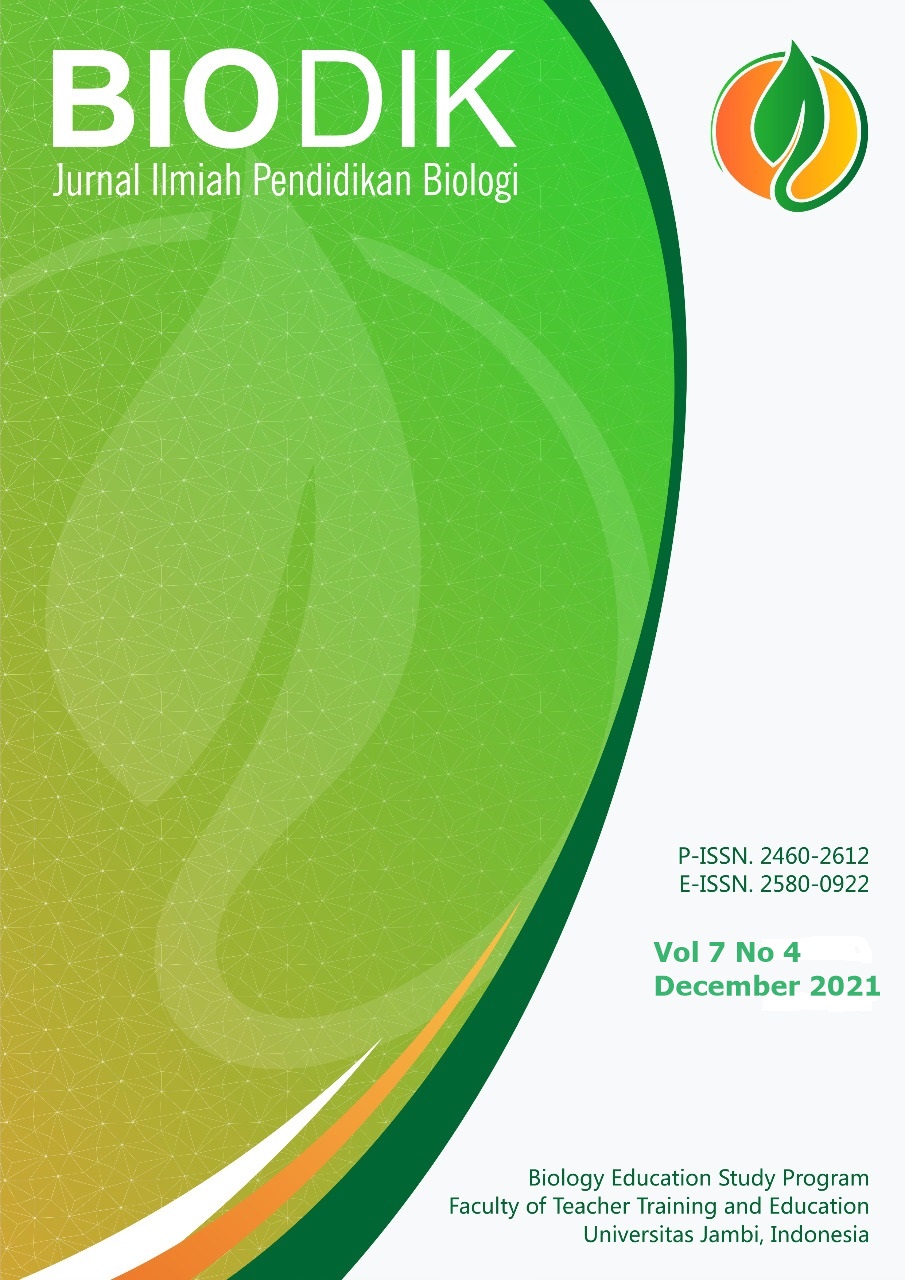Pengembangan E-Modul Sigil Software Untuk Meningkatkan Hasil Belajar Siswa Di Masa Pandemi Covid-19
(Development of Sigil Software E-Modules to Improve Student Learning Outcomes During The Covid-19 Pandemic)
DOI:
https://doi.org/10.22437/bio.v7i4.15204Abstract
Learning activities are currently carried out online from home in order to prevent the spread of Covid-19. Appropriate learning alternatives are needed for students in times of pandemics. The purpose of this research is to develop e-modules of ecosystem materials that are expected to support the improvement of student learning outcomes during the Covid-19 pandemic. This research was conducted in January-July 2021 using the Research and Development (R&D) method in the ADDIE model. The client's goal of the product was tested on a limited basis to 27 class X students. The instruments used in this study are media feasibility validation sheets, learning outcome tests to measure the effectiveness of e-modules and questionnaires of student responses to developed media. The results showed that E-modules that have been developed and validated by experts get a very decent category as a learning medium with a value of 92.85% and e-modules developed can improve student learning outcomes. The conclusion obtained that the e-modules developed are feasible and effectively used as teaching materials to help students in the learning process.
Abstrak. Kegiatan pembelajaran pada saat ini dilaksanakan secara daring dari rumah dalam rangka pencegahan penyebaran Covid-19. Dibutuhkan alternatif pembelajaran yang tepat bagi siswa di masa pandemi. Tujuan penelitian ini yaitu mengembangkan bahan ajar e-modul materi ekosistem yang diharapkan  dapat menunjang peningkatkan hasil belajar siswa disaat pandemi Covid-19. Penelitian ini dilaksanakan pada bulan Januari-Juli 2021 dengan menggunakan metode Research and Development (R&D) menggunakan model ADDIE. Sasaran klien dari produk hasil penelitian ini diujicobakan secara terbatas kepada siswa kelas X dengan jumlah 27 orang. Instrument yang digunakan dalam penelitian ini berupa lembar validasi kelayakan media, tes hasil belajar untuk mengukur efektivitas e-modul dan angket respon siswa terhadap media yang dikembangkan. Hasil penelitian menunjukkan bahwa E-modul yang telah dikembangkan dan divalidasi oleh ahli mendapat kategori sangat layak sebagai media pembelajaran dengan nilai 92,85% dan e-modul yang dikembangkan dapat meningkatkan hasil belajar siswa. Kesimpulan yang didapat bahwa e-modul yang dikembangkan layak dan efektif digunakan sebagai bahan ajar untuk membantu siswa dalam proses pembelajaran.
Downloads
References
Adhim, M. H., Rachmadiarti, F., & Prastiwi, M. S. (2013). Profil Media Animasi Interaktif Materi Daur Biogeokimia Untuk SMA. Bioedu, 2(3), 179–184.
Amalia, F., & Kustijono, R. (2017). Efektifitas Penggunaan E-Book dengan Sigil untuk Melatihkan Kemampuan Berpikir Kritis. Prosiding Seminar Nasional Fisika (SNF), 1, 81–85.
Ernawati, I., & Sukardiyono, T. (2017). Uji Kelayakan Media Pembelajaran Interaktif Pada Mata Pelajaran Administrasi Server. Elinvo (Electronics, Informatics, and Vocational Education), 2(2), 204–210. https://doi.org/10.21831/elinvo.v2i2.17315
Fitri, A., Netriwati, N., & Andriani, S. (2021). Sigil Software sebagai Pengembangan E-Modul Pembelajaran Matematika. AlphaMath : Journal of Mathematics Education, 7(1), 1. https://doi.org/10.30595/alphamath.v7i1.8492
Laili, I., Ganefri, & Usmeldi. (2019). Efektivitas Pengembangan E-Modul Project Based Learning Pada Mata Pelajaran Instalasi Motor Listrik. Jurnal Imiah Pendidikan Dan Pembelajaran, 3(3), 306–315. https://ejournal.undiksha.ac.id/index.php/JIPP/article/download/21840/13513
Muhasim. (2017). Pengaruh Tehnologi Digital, Terhadap Motivasi Belajar Peserta Didik. Palapa: Jurnal Studi Keislaman Dan Ilmu Pendidikan, 5(2), 53–77.
Muyaroah, S., & Fajartia, M. (2017). Pengembangan Media Pembelajaran Berbasis Android Menggunakan Aplikasi Adobe Flash Cs 6 Pada Mata Pelajaran Biologi. Innovative Journal of Curriculum and Educational Technology, 6(2), 79–83. https://doi.org/10.35438/e.v8i1.221
Pradini, N. N., Fitrihidajati, H., & Isnawati. (2015). Penerapan Media Animasi Interaktif Daur Biogeokimia Terhadap Hasil Belajar Siswa. Bioedu, 4(3), 1008–1012.
Pralisaputri, K. R., Soegiyanto, H., & Muryani, C. (2016). Pengembangan Media Booklet Berbasis SETS Pada Materi Pokok Mitigasi Dan Adaptasi Bencana Alam Untuk Kelas X SMA. Jurnal GeoEco, 2(2), 147–154.
Purwanto. (2002). Psikologi Pendidikan. Remaja Rosda Karya.
Retnowati, R., & Istiana, R. (2018). Metode Penelitian Sosial (1st ed.). Langit Arbitter.
S.Sirate, S. F., & Ramadhana, R. (2017). Pengembangan Modul Pembelajaran Berbasis Keterampilan Literasi. Inspiratif Pendidikan, 6(2), 316. https://doi.org/10.24252/ip.v6i2.5763
Sa’id, M. S. (2021). Kurangnya Motivasi Belajar Matematika Selama Pembelajaran Daring Di MAN 2 Kebumen. Jurnal Ilmiah Matematika Realistik (JI-MR), 2(2), 7–11.
Saputra, K. Y. (2015). Pengaruh Proses Pembelajaran Dan Motivasi Belajar Terhadap Hasil Belajar IPS Siswa SMP. Jurnal Pendidikan Ekonomi Undiksa, 5(1), 1–10.
Sidiq, R., & Najuah. (2020). Pengembangan E-Modul Interaktif Berbasis Android pada Mata Kuliah Strategi Belajar Mengajar. Jurnal Pendidikan Sejarah, 9(1), 1–14. https://doi.org/10.21009/jps.091.01
Susanti, F. (2015). Pengembangan E-Modul Dengan Aplikasi Kvisoft Flipbook Maker Pada Pokok Bahasan Fluida Statis Untuk Peserta Didik SMA/MA Kelas X. UIN Sunan Kalijaga, Yogyakarta.
Yektyastuti, R., & Ikhsan, J. (2016). Pengembangan Media Pembelajaran Berbasis Android pada Materi Kelarutan untuk Meningkatkan Performa Akademik Peserta Didik SMA Developing Android-Based Instructional Media of Solubility to Improve Academic Performance of High School Students. Jurnal Inovasi Pendidikan IPA, 2(1), 88–99.
Downloads
Published
How to Cite
Issue
Section
License
Copyright (c) 2021 Rifki Risma Munandar, Rusdianti Cahyani, Eva Fadilah

This work is licensed under a Creative Commons Attribution-NonCommercial-ShareAlike 4.0 International License.
Copyright Notice
Authors who publish with Biodik : Jurnal Ilmiah Pendidikan Biologi agree to the following terms:
- For all articles published in Biodik : Jurnal Ilmiah Pendidikan Biologi, copyright is retained by the authors and grant the journal right of first publication with the work simultaneously licensed under a Creative Commons Attribution-ShareAlike 4.0 International Licensethat allows others to share the work with an acknowledgment of the work's authorship and initial publication in this journal.
- Authors are able to enter into separate, additional contractual arrangements for the non-exclusive distribution of the journal's published version of the work (e.g., post it to an institutional repository or publish it in a book), with an acknowledgment of its initial publication in this journal.
- Authors are permitted and encouraged to post their work online (e.g., in institutional repositories or on their website) prior to and during the submission process, as it can lead to productive exchanges, as well as earlier and greater citation of published work (See The Effect of Open Access).
















